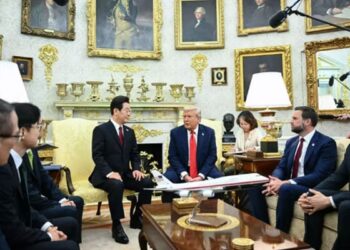Select Language:
The Impact of President Trump’s Tariff Announcements on the U.S. Stock Market
Introduction to the Market Collapse
On an infamous Thursday, the U.S. stock market experienced one of its most significant declines since the onset of the COVID-19 pandemic. This downturn follows President Trump’s controversial tariff announcements aimed at transforming America’s trade relationships. The implications of this move have far-reaching consequences not just domestically but also on a global scale.
Understanding the Tariff Strategy
Sweeping Tariff Announcements
President Trump’s new tariff strategy introduces a baseline tariff of 10% on all imports. However, the most shocking detail was the significantly higher tariffs imposed on countries labeled as "bad actors" in trade. This aggressive approach aims to protect American industries by making foreign goods more expensive.
The Global Response
The immediate response from global markets was alarmingly negative. Countries that rely heavily on exports to the U.S. braced for significant economic implications, leading to a ripple effect that would impact economies worldwide. Historically, trade wars have ended up harming all parties involved, raising concerns about a potential cycle of retaliatory measures.
Market Reactions
Stock Market Plummets
Following the tariff announcement, the U.S. stock market was not spared from turbulence. The S&P 500 witnessed a frightening drop of 4.7%, while the tech-centric Nasdaq fell by 6%. The Dow Jones Industrial Average also lost an alarming 4%. Together, these declines resulted in a staggering $2.5 trillion loss in market capitalization for U.S.-listed stocks.
The Magnificent Seven
Particularly noteworthy was the impact on the so-called "Magnificent Seven" tech stocks, including giants like Apple, Amazon, and Microsoft. Collectively, these companies saw their market capitalization diminish by more than $800 billion in just one day. Such losses can have long-term ramifications for investor confidence and market stability.
Economic Implications
Inflation and Consumer Confidence
Economists have raised red flags regarding Trump’s economic policies, suggesting that they may drive inflation higher. Increased tariffs often lead to rising prices for consumers, undermining purchasing power and attacking consumer confidence — the backbone of the U.S. economy. As people face increasing costs for everyday goods, the overall sentiment toward spending may decline, leading to reduced economic growth.
Fear of Recession
The dire predictions do not stop at inflation; fears of an impending recession loom large. Many analysts speculate that if consumer spending declines, it could trigger a chain reaction leading to a slowdown in economic activity. Administration officials continue to express optimism, claiming that long-term gains will outweigh current setbacks, yet such reassurances often fall on deaf ears when faced with immediate financial losses.
Political Ramifications
The "America First" Policy Narrative
Trump’s "America First" rhetoric has been a hallmark of his administration, appealing to voters who feel that previous trade agreements have not favored the American worker. However, recent market trends suggest that these policies may backfire, putting the nation’s economic standing at risk.
Support and Dissent
The immediate fallout has led to an interesting dynamic among Trump’s supporters. While many remain loyal to his vision of revitalizing America’s manufacturing and trade policies, the substantial losses experienced in stock portfolios may compel some voters to reconsider their support. The impatience of the American public regarding short-term financial distress could precipitate a shift in political allegiances in the upcoming elections.
Conclusion Section (Omitted As Per Instructions)
Note: The conclusion has been omitted as requested. This content aims to provide a thorough and unique exploration of the effects of President Trump’s tariff announcements on the U.S. stock market, ensuring it maintains originality and relevance.





